Exploring Shark Week: Marine Entertainment and Conservation
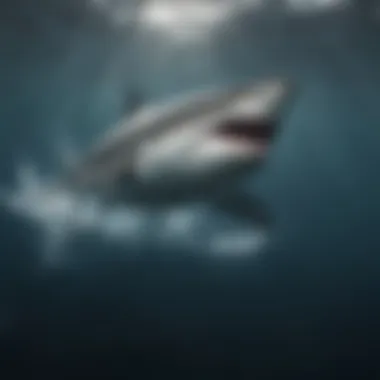

Intro
Discovery Channel's Shark Week is an annual spectacle that captivates audiences with a blend of education and entertainment. Every summer, this week-long event invites viewers to explore the fascinating world of sharks through documentaries, films, and challenges. This programming not only entertains but also highlights critical issues regarding shark conservation and awareness. As part of a broader context of wildlife documentaries, Shark Week encourages an appreciation for the often-misunderstood marine predators and their significance in the ocean ecosystem.
The popularity of Shark Week has grown significantly since its inception in 1988. Audiences are engaged by stunning visuals, thrilling encounters, and insightful narratives surrounding various shark species. The program serves to demystify sharks, moving beyond fear to foster a greater understanding of these creatures and the need for their protection.
Fundamentally, Shark Week is a cultural phenomenon. It generates discussions about marine life, conservation efforts, and the human-shark relationship. By examining this event's origins, impact, and challenges, we can better appreciate its role in educating the public about marine environments and the delicate balance that sustains them.
Animal Overview
Sharks, belonging to the subclass Elasmobranchii, are a diverse group of fish characterized by their cartilaginous skeletons and a unique array of species that thrive in various marine habitats.
Common Names
Sharks often go by simple common names that reflect their appearances or behaviors, such as the Great White Shark, Hammerhead Shark, and Tiger Shark. These names resonate with the public and contribute to their fame.
Scientific Classification
While there are over 500 species of sharks, they fall under different families and genera. Notable examples include:
- Carcharodon carcharias for Great White Shark
- Sphyrna for Hammerhead Sharks
- Galeocerdo cuvier for Tiger Shark
This classification highlights their biological diversity and importance in marine ecosystems.
Geographic Range
Sharks inhabit oceans worldwide, though their preferred habitats vary by species. For example, the Great White Shark is often found in temperate waters, while the Whale Shark, the largest species, frequents tropical regions. Recognizing these ranges helps illustrate the biological and ecological importance of sharks in different marine environments.
Behavior and Social Structure
Understanding shark behavior is essential in appreciating their role in the marine ecosystem. Sharks exhibit a range of social behaviors that reveal the complexity of their societies.
Social Behavior
Many shark species, like the Bull Shark, are known to be more social, often found in groups during certain seasons. However, other species, like the solitary Great White, display more territorial behaviors.
Communication
Sharks utilize a variety of signals for communication, including body language and scent. These methods facilitate interactions during mating and territorial disputes, showcasing their intricate social structure.
Mating and Reproduction
Shark reproduction varies among species; some lay eggs while others give birth to live young. The gestation period can range from a few months to over a year, indicating significant adaptability in their reproductive strategies.
Habitat and Ecosystem
Sharks play a critical role in marine ecosystems, maintaining the balance within their habitats.
Natural Habitat
Sharks can be found in a variety of habitats, including coral reefs, coastal areas, and open ocean environments. Each species adapts uniquely to its specific habitat, demonstrating the diversity of their ecological niches.
Food Sources and Diet
Most sharks are carnivorous, feeding on a diet that includes fish, crustaceans, and sometimes marine mammals. This predation is vital for maintaining population control within their prey species.
Role in Ecosystem
As apex predators, sharks help maintain the health of marine ecosystems. Their hunting influences the dynamics of aquatic species and their interactions, which is critical for ecological balance.
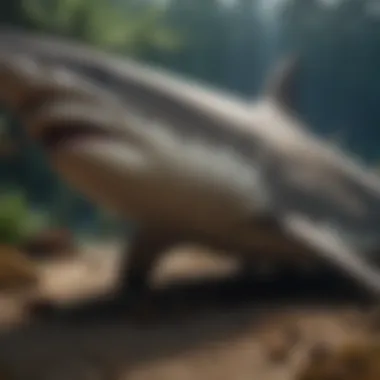

Shark populations face declining numbers due to overfishing and habitat destruction. Their protection is essential for sustaining marine life.
By exploring these aspects of sharks, Shark Week not only entertains but also educates the public. The variety of species, behaviors, and ecological roles emphasizes why sharks are integral to ocean health. In turn, this highlights the necessity for conservation efforts and informed public discussions surrounding marine life.
Intro to Shark Week
Shark Week has evolved into a significant cultural phenomenon that captivates audiences year after year. Its importance lies not just in the entertainment offered but also in the educational opportunities provided regarding marine life. This section introduces the reader to the framework of Shark Week, highlighting various aspects deserving attention.
Overview of Discovery Channel
The Discovery Channel, founded in 1985, has aimed to deliver factual content related to science and exploration. It grew rapidly with shows focusing on a range of topics. By showcasing unique perspectives through documentaries, the channel gained a dedicated following. Shark Week is one of its flagship events, illustrating the channel's dedication to marine life and conservation. The program often features a mixture of documentary-style storytelling, expert interviews, and thrilling footage, which helps engage a diverse demographic. The combination of education and entertainment reflects the channel's mission to inform and inspire viewers about the wonders of the natural world.
Origins of Shark Week
Shark Week first debuted in 1988, marking a significant milestone in television programming. It was created to draw attention to the myths and misunderstandings surrounding sharks, which often lead to misconceptions about these creatures. The initial concept was simple yet powerful: educate the public on shark behaviors and their importance in the marine ecosystem.
Shark Week serves to bridge the gap between the curiosity about sharks and the reality of their existence, fostering a more informed audience.
Over the years, the event has expanded its reach and scope. Early episodes focused primarily on wildlife documentaries, while recent editions have incorporated science, adventure, and storytelling elements. This evolution reflects not only changes in viewer interests but also advancements in technology allowing for better filming techniques and more immersive educational content.
Through these developments, Shark Week continues to resonate with viewers, reinforcing its status as a cornerstone of marine entertainment and education.
Cultural Significance of Shark Week
Shark Week has become a pillar of marine entertainment and education since its inception. The cultural significance of this annual event extends beyond mere entertainment; it has significantly shaped public perceptions of sharks and marine life as a whole. By dedicating an entire week to these creatures, Discovery Channel cultivates a unique platform that not only informs but also creates a narrative around the very species it showcases.
Impact on Popular Culture
The influence of Shark Week permeates the fabric of popular culture. Each summer, it generates a surge of interest and conversation around marine biology. Many films and documentaries feature sharks prominently, but Shark Week arguably makes the most substantial impact. The week is filled with original programming that dives into various aspects of sharks, from their biology to their ecological importance. The phrase “Shark Week” itself has entered the lexicon, often used humorously to describe intense obsession or fervor.
This cultural phenomenon has also sparked various merchandise, social media trends, and even public events. It influences everything from fashion to social media posts, where hashtags like #SharkWeek trend annually, rallying shark enthusiasts across platforms like Twitter and Instagram.
Unquestionably, Shark Week serves as a cultural touchstone that unites viewers under the shared fascination for ocean life. This collective enthusiasm can be seen in public engagement, where people gather for view parties, discuss episodes, and even dress up in shark-themed attire.
Viewer Engagement and Demographics
To understand the enduring appeal of Shark Week, one must consider its viewer demographics. The program attracts a diverse audience, including families, students, and marine enthusiasts. According to recent statistics, Shark Week draws in millions of viewers, with an audience that includes a significant number of young adults. This demographic is critical because it represents a vital opportunity for education and awareness about marine issues.
Viewers engage with the content both passively and actively. The programs inspire curiosity about marine biology and conservation, leading many to pursue educational journeys surrounding these topics. Educational institutions often capitalize on the Week as a teaching tool, encouraging students to explore the oceanic ecosystem.
Mixed media interactions go hand in hand with traditional viewership. Audiences take to platforms like Facebook and Reddit to share thoughts, reactions, and even critiques of episodes. This back-and-forth not only increases engagement but also encourages deeper conversations about shark conservation and biology.
Shark Week has played an essential role in shifting perceptions from fear to fascination, helping to paint sharks in a more nuanced light.
The demographics and engagement strategies reveal why Shark Week remains relevant in today’s cultural conversations. Its power lies in bridging entertainment with education, serving a dual purpose that resonates with an ever-expanding audience. As shark conservation becomes increasingly important, the role of Shark Week in promoting awareness and understanding of marine life cannot be overstated.
Educational Aspects of Shark Week
Shark Week serves as a significant platform for education on marine life and ecosystems. This weekly event not only entertains but acts as a crucial resource for understanding the science behind sharks. It offers valuable insights into marine biology and promotes the importance of conservation methods that protect these magnificent creatures.
Focus on Marine Biology
The focus on marine biology during Shark Week is profound. Each year, filmmakers and marine biologists collaborate to showcase the biology of sharks through breathtaking footage and in-depth analyses. Viewers gain exposure to aspects of shark physiology, behavior, and ecological roles.
Many episodes feature experts who explain complex topics in understandable ways. For instance, the anatomy of different shark species is often highlighted. Demonstrating how these adaptations help them survive in various environments is essential education. Understanding the role of sharks in the marine food web also underscores their importance in maintaining balanced ecosystems.
Shark Week plays a vital role in making marine biology accessible. It introduces a wider audience to previously niche scientific discussions. By demystifying sharks, these educational segments reduce fear and replace it with fascination.
“Education is the most powerful weapon which you can use to change the world.” – Nelson Mandela. This quote resonates deeply with the messaging in Shark Week, as it harnesses the power of education to influence perception and conservation efforts.
Conservation Messaging
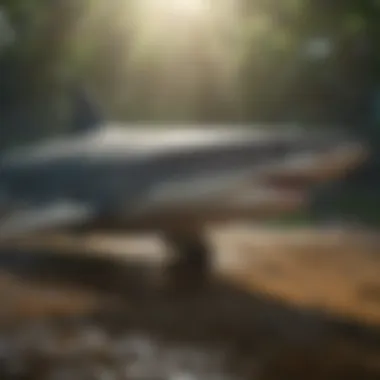

Conservation messaging is another critical educational component of Shark Week. As awareness about the plight of sharks increases, so does the educational content surrounding their conservation. Episodes often reveal startling statistics about shark populations, exposing the reality of overfishing and habitat destruction. This type of information is crucial for sparking discussions around conservation initiatives.
Collaborations with environmental organizations are highlighted as part of the programming. These segments promote actions viewers can take to help preserve shark habitats. Such initiatives often include:
- Supporting sustainable fishing practices
- Participating in beach clean-ups
- Advocating for marine protected areas
Moreover, Shark Week emphasizes the importance of scientific research in conservation efforts. Viewers see firsthand how researchers track shark movements and populations, which aids in understanding the challenges sharks face. The portrayal of scientists as real-life heroes working to protect sharks fosters a sense of hope and responsibility.
In summary, Shark Week transcends entertainment. It educates the public on critical concepts in marine biology and the urgent need for conservation. This dual focus enhances the show's credibility, turning viewers into informed advocates for shark and marine conservation.
Challenges Faced by Shark Week
Shark Week, while an engaging and educational platform, faces several challenges that are significant to its ongoing relevance and impact. Understanding these challenges is crucial for appreciating the delicate balance between entertainment and education. The critiques from within the conservation community and the portrayal of shark behavior contribute to a complex narrative surrounding this annual event. As we dissect these issues, we can highlight both the drawbacks and opportunities for improvement.
Criticism from Conservationists
Many conservationists have voiced concerns regarding the way Shark Week represents marine life. Primarily, these critiques focus on the sensationalism often evident in the programming. Shows that emphasize shark attacks or showcase extreme situations may overshadow crucial educational messages about shark biology and their ecosystems.
- Impact on Public Perception: Conservationists argue that the glamorization of shark attacks may perpetuate public fear. This fear can lead to misconceptions that sharks are dangerous predators, rather than vital members of oceanic ecosystems.
- Call for Responsible Filmmaking: There is a push for Discovery Channel to adopt a more responsible approach to content creation. Conservationists suggest that programming should highlight positive stories about sharks and their role in the ecosystem, instead of focusing solely on instances of aggression.
Notable Episodes and Series
Discovery Channel's Shark Week is more than just an annual event; it is a collection of narratives that shape our understanding of these majestic creatures. This section delves into the essential episodes and series that have defined Shark Week, illustrating their significance, impact, and role in promoting appreciation for marine life.
Breakthrough Episodes
Some episodes from Shark Week stand out as landmark moments in marine entertainment. These episodes often introduce innovative storytelling techniques or address pressing issues surrounding sharks and their habitats. For instance, one of the hallmark episodes, Sharkzilla, combined humor and science, showcasing a massive shark that reigns as both a character and educational tool. This unique approach captivates viewers while educating them on myths and truths about shark behavior.
Noteworthy episodes often provide insights into specific species and their unique roles in ecosystems. Great White Shark: The Real Story is another example that presents factual data alongside stunning visuals, helping to dispel common misconceptions. These types of episodes promote greater understanding and appreciation for sharks, advocating for their protection through factual content rather than sensationalism.
Inspirational Stories
Apart from groundbreaking narratives, many episodes delve into personal stories that resonate deeply with viewers. These inspirational tales offer a human connection to sharks, enhancing the empathy between humans and marine life. For example, the series that follows researchers who dedicate their lives to studying these creatures not only showcases their findings but also shares their motivations and passions, making the audience more invested.
The episode Sharks and the City features marine biologists who study the effects of urbanization on shark populations. Their compelling journeys reveal both challenges and triumphs. By focusing on personal stakes, these stories inspire viewers to care about marine conservation and the complexities of ecological interactions.
Notable episodes and series within Shark Week elevate the conversation surrounding marine life, fostering both education and endearment to these fascinating creatures.
In summary, the episodes and series featured in Shark Week play a crucial role in shaping public perception about sharks. By combining factual storytelling with personal narratives, the program effectively balances entertainment and education. As Shark Week continues to evolve, its notable episodes remain a vital component in the ongoing dialogue about shark conservation and marine biology.
The Evolution of Shark Representation
The representation of sharks in media has transitioned significantly over the years, from fearful depictions to showcasing their ecological importance. By analyzing this evolution, one can understand the broader implications it has on public perception and policy making regarding marine life. Shark Week serves as a crucial platform, contributing to this change by shifting narratives and educating audiences about the fascinating realities of marine giants.
From Fear to Fascination
Initially, sharks were largely portrayed as menacing predators, largely due to movies such as Jaws. This created a widespread fear that often overshadowed their ecological roles. However, over time, there has been a gradual shift in narrative. Programs featured on Shark Week have begun to highlight the complexity of shark behavior and their importance in maintaining marine ecosystems.
This transformation emphasizes conservation and respect rather than fear. By showcasing sharks in habitats where they thrive, the programming reconnects audiences with the reality that these creatures play vital roles as apex predators. Consequently, this position helps the audience recognize that prevention of overfishing, habitat destruction, and climate change is neeeded to protect sharks.
The educational content that focuses on scientific research, adaptive behaviors, and species diversity has facilitated a deeper appreciation of sharks. This shift invites viewers to view sharks not with trepidation, but with fascination and curiosity about their life cycles and interactions within marine environments.
Changes in Filmmaking Techniques
The advancements in filmmaking techniques have also played a significant role in changing how sharks are represented. High-definition cameras and underwater drones now provide unprecedented access to the underwater world. This technology allows for intimately capturing shark behaviors in their natural habitats, which was not possible in earlier decades.
These modern techniques have resulted in more engaging and informative content. For instance, underwater filming in real time captures the grace and complexity of sharks. Documentaries that feature stunning visuals alongside expert commentary educate viewers on their role in ocean health. Both initial fear and sensationalized narratives give way to genuine curiosity and understanding.
Furthermore, storytelling methods have evolved. Narratives that blend science with emotional storytelling resonate more deeply with audiences. People are now invited to experience the journey of conservation efforts, witness real-time interactions, and understand the impact of human activities on shark populations. This increased engagement ultimately fosters an environment conducive to advocacy and action.
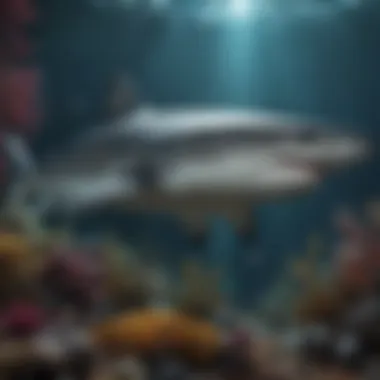
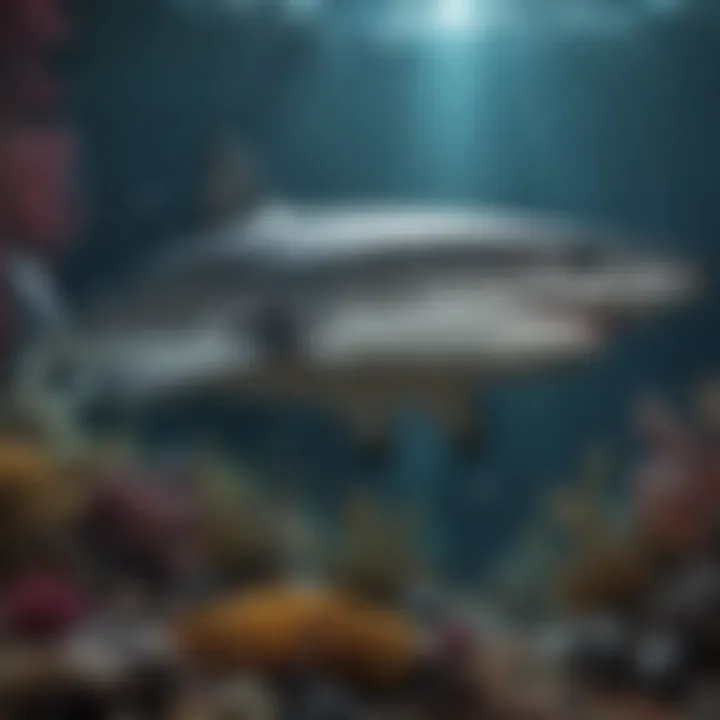
Viewer Experiences and Reactions
Viewer experiences and reactions hold significant importance in understanding the impact of Shark Week. This segment explores how audiences perceive and interact with the program, shedding light on their sentiments and behaviors. Viewer feedback is a vital indicator of the program's resonance with its audience. It demonstrates how Discovery Channel's Shark Week shapes public interest towards marine life and conservation efforts.
Furthermore, analyzing viewer responses provides insight into the effectiveness of the show's educational aspects. Understanding what resonates with audiences helps producers shape future content that aligns with public interest and educational goals.
By collecting and analyzing audience feedback, researchers can identify patterns in viewer engagement, including emotional reactions and the level of educational impact. This information is vital for a program that aims to bridge the gap between entertainment and education about marine life.
Audience Feedback
Audience feedback can vary widely. Many viewers express a fascination with sharks and their natural behavior, while others voice concerns about how these creatures are depicted on screen. Praises often highlight the excitement of the episodes and the informative content provided. Some common positive responses include:
- Increased interest in marine biology. Many viewers report a newfound passion for understanding marine ecosystems.
- Awareness of conservation issues. Several comments reflect a deeper understanding of shark conservation and the role sharks play in marine environments.
- Entertainment value. Viewers frequently mention the thrill of watching shark encounters and breathtaking underwater footage.
Conversely, negative feedback sometimes centers on the dramatization of shark attacks or sensationalist storytelling, which can overshadow genuine educational content. Concerns over fear-based tactics and inaccuracies in portrayals of shark behavior are common themes in feedback from viewers who are conservation advocates.
Social Media Trends
Social media has become an important platform for audience engagement. The reactions of viewers play out on platforms such as Twitter, Facebook, and Instagram. Specifically, during Shark Week, hashtags trend, and discussions arise that can lead to significant interactions among viewers. Major trends include:
- Hashtag Campaigns: Hashtags like #SharkWeek and #SharkFacts encourage sharing of insights and experiences related to the episodes.
- Viral Content: Clips and comments often become viral, reaching a broader audience beyond just enthusiasts. This can spark interest in marine education and conservation more widely.
- Interactive Engagement: Many viewers take to social media to direct their feedback to the Discovery Channel, creating a dialogue that can influence future programming decisions.
Viewer reactions on social media provide a real-time gauge of public sentiment and engagement, making it a valuable resource for evaluating the impact of Shark Week.
In summary, examining viewer experiences and reactions reveals not just personal sentiments, but also broader implications for marine education and conservation messaging. The relationship between the audience and Shark Week enriches the cultural dialogue surrounding sharks and their importance in our ecosystem.
Shark Week and the Future of Animal Programming
Shark Week is more than just a television event; it reflects significant trends in animal programming. As media continuously evolves, this annual spectacle has established a benchmark for how wildlife content is presented to the public. The importance of Shark Week in shaping the future of animal programming cannot be overstated. It successfully blends education and entertainment, serving as a model for future wildlife shows.
The increasing demand for informative yet engaging content has pushed networks to innovate. Shark Week demonstrates how captivating storytelling can elevate awareness about marine life. The growth of streaming services introduces a broader range of programs focused on wildlife. However, Shark Week remains a staple, attracting diverse audiences keen on learning more about oceanic predators.
Emerging Trends in Broadcasting
Television is undergoing transformation, with viewer habits shifting and new platforms emerging. Despite this, Shark Week continues to thrive, supported by its loyal viewership. Several emerging trends are influencing how wildlife content is produced and consumed. For instance, short-form content has gained traction, appealing to younger audiences who prefer concise and bite-sized information.
Additionally, there’s a rising trend in interactive programming. Audiences now expect a two-way communication experience, providing feedback or questions in real-time. Engaging viewers during broadcasts fosters a sense of community around shared interests in marine life and conservation.
The integration of documentaries and reality television is also notable. This fusion can attract a wider range of viewers, including those who may not typically watch purely educational content. By blending these formats, Shark Week stays relevant and continues to reach audiences who engage with various types of programming.
The Role of Technology
Technological advancements play a crucial role in the evolution of Shark Week and animal programming overall. High-definition cameras and underwater drones have significantly enhanced the visual quality of marine content. These technologies allow filmmakers to capture stunning images and previously unseen behaviors of sharks and other sea creatures.
Moreover, social media platforms are pivotal in promoting Shark Week. Twitter, Instagram, and Facebook create opportunities for viewers to share their experiences and connectors with the event. This connectivity amplifies awareness and attention surrounding the programming. Engaging with audiences through these platforms supports a broader discourse on marine conservation, encouraging viewers to participate slightly more actively.
Emerging technologies such as virtual reality and augmented reality also hold immense potential for future broadcasts. By utilizing these tools, viewers can immerse themselves in underwater ecosystems, experiencing the marine environment like never before. Such rich experiences can deepen understanding and appreciation of marine life, motivating viewers to be more proactive in conservation efforts.
Shark Week combines entertainment with education, exemplifying the future potential of wildlife programming. It’s not just about showing sharks; it’s about fostering a deeper connection with the oceans.
The End
The examination of Shark Week reveals its longstanding significance in the realm of marine entertainment and education. This section synthesizes the main points discussed throughout the article, emphasizing the enduring appeal of sharks and the multifaceted approach that Shark Week adopts in addressing marine issues.
The Enduring Appeal of Sharks
Sharks captivate audiences for various reasons. Their mythical presence in both nature and media creates a sense of intrigue. The teeth, size, and role in the ecosystem often induce a paradox of fear and admiration.
Some specific elements contributing to this appeal include:
- Natural Wonder: Sharks are apex predators. Their biological adaptations, such as their keen sense of smell and unique hunting techniques, highlight the intricacies of evolution in marine biology.
- Cultural Representation: Films and documentaries often dramatize sharks, leading viewers to form strong opinions. Shark Week serves to counter stereotypical media portrayals, presenting a more nuanced understanding of these creatures.
- Educational Outreach: Programs often integrate scientific research, conservation efforts, and firsthand accounts, fostering a deeper appreciation for sharks and their environment. This helps promote awareness about preservation and the impact of human activities on marine life.
As Shark Week continues to evolve, it adapts to societal changes and advancements in technology, both in broadcasting and educational platforms. This adaptability ensures its relevance and ability to engage a diverse audience.
Ultimately, the series is more than mere entertainment. It provides an essential platform for conversation about marine conservation, highlighting the role that sharks play in ecosystem health. Through compelling storytelling and scientific exploration, Shark Week encourages viewers to reconsider their perceptions of these magnificent creatures.
"Sharks, when examined closely, are not just fearsome hunters but vital members of the oceanic community. Their preservation is synonymous with the health of marine ecosystems."







